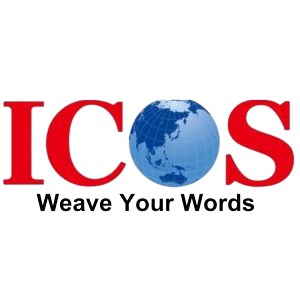Korean Translation Services: What you need to know before expanding to Korea
So there I was, two episodes deep into a Korean drama because my friend said it would “change my life.” I was skeptical, obviously, I mean, nothing has changed my life since pizza was invented. But I gave it a shot.
Five minutes in and someone was crying into their kimchi like they’d just lost their dog, job, and sense of taste, all at once.
There’s yelling, there’s dramatic piano music, and then “BAMMM” someone throws a shoe.
And I’m sitting there like, “Is this a breakup? A cooking competition? Did he forget their anniversary, or did he forget to microwave the kimchi?”
Turns out, I had no subtitles on. Which, as you can imagine, is not such a great thing when you speak zero Korean and your idea of cultural fluency is only knowing how to pronounce “BTS.”
Now, imagine the same in a business meeting. You’re closing a deal in Seoul. You think you’re saying, “Let’s build a long-term partnership.” But thanks to your bargain-bin translator app, you actually said, “Let’s cook pants together for eternity.”
Yeah. Pants.
And while your new Korean partners politely nod and reconsider every decision that led them to this moment, you’re wondering why no one’s replying to your emails.
It’s not sabotage. It’s syntax.
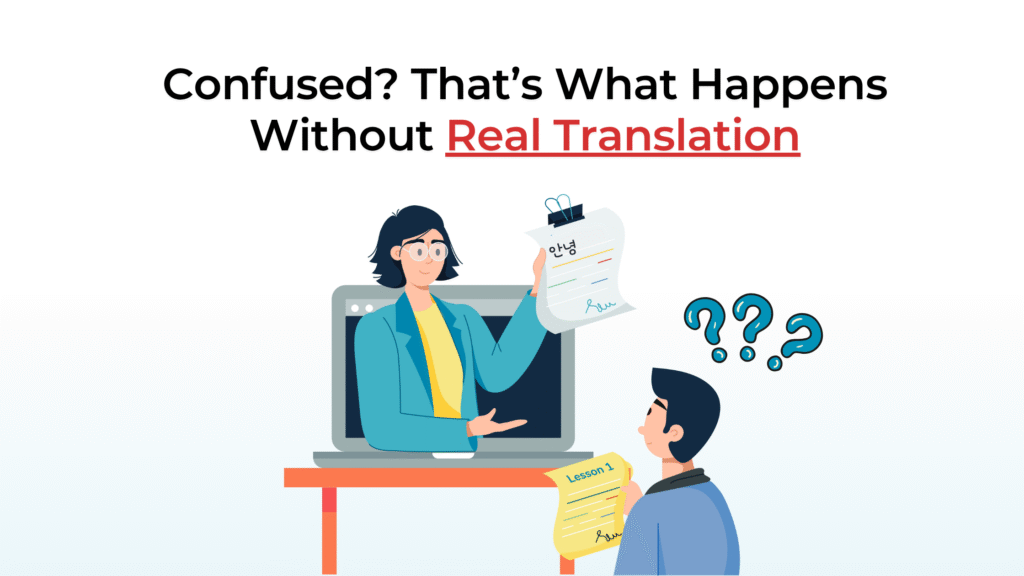
Which brings us to the point: You need Korean translation services.
Not the kind your intern found on page 8 of a Google search. I’m talking about real, certified, professional human translators: People who can tell the difference between “profit margins” and “pickled radish.”
Because in business, much like in K-dramas, the wrong translation can cost you your deals, dignity, and possibly your lunch break.
Let’s dive in before you accidentally propose marriage to a Korean vendor.😉(Just kidding)
What Makes Professional Korean Translation Services Worth It (And No, Google Translate Is Not Invited)?
So you’ve finally recovered from that kimchi miscommunication, and you’re asking yourself: What’s the big deal with professional Korean translation services anyway?
Well, ask yourself this—are you handling legal documents, medical files, B2B contracts, or anything more serious than texting your Korean food order with emojis? If the answer is yes, then spoiler alert: you need professionals.
Because real translation isn’t just swapping English words for Korean ones. It’s about getting the tone right. The meaning. The vibe.
It’s the difference between saying “We’re committed to your success” and accidentally offering someone a second-hand karaoke machine from 1996.
Still want to DIY it with your intern and a K-pop dictionary? Be my guest. Just don’t blame me when your contract starts with “Dear respected kimchi warrior.”
And no, “fluent in watching Squid Game” does not count as a certification.
To know more on why you need professional translation services Click here
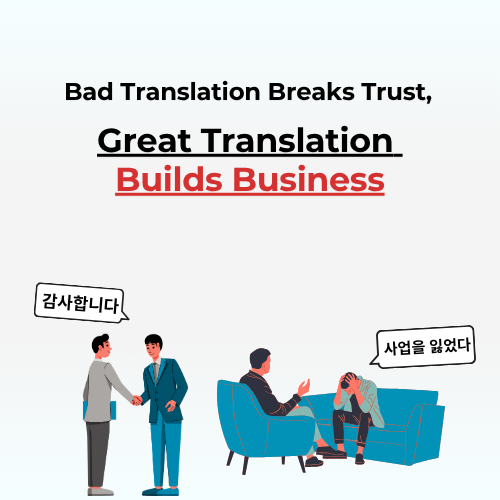
Why Does English to Korean Translation Deserve More Than a Copy-Paste Job from Seoul to San Jose?

Let’s get one thing straight: English to Korean translation isn’t just about replacing “Hello” with “안녕하세요.”
It’s about understanding that the way you pitch a SaaS product in Silicon Valley does not work the same way in South Korea, where hierarchy, honorifics, and word choice can affect a deal more than your pricing page ever will.
Korean business culture is deeply relationship-driven.
Formality matters. Brand tone matters.
Even fonts can scream “untrustworthy” if they don’t match local design sensibilities. (You didn’t see that on Google Translate, did you?)
So when we translate, we localize like your business depends on it. Because it sure does.
How Can Korean Translation to English Be the Difference Between “New Market Entry” and “Epic Flop”?
You’ve secured a Korean distributor. You’ve launched a K-influencer campaign. You’ve even learned to pronounce “Hallyu” without accidentally ordering soup. But if your Korean translation to English reads like someone fed a legal contract through a blender? Congratulations—you’ve just made your pitch unreadable.
Business English in Korea is often ultra-formal, full of honorifics and layered meanings. If you strip that down without care, you might accidentally remove the very trust and politeness your brand needs to survive in international waters.
What you need is not just a translator. You need a cross-cultural chameleon who knows when to tone it down, jazz it up, or rewrite entirely, while still keeping your brand voice intact.
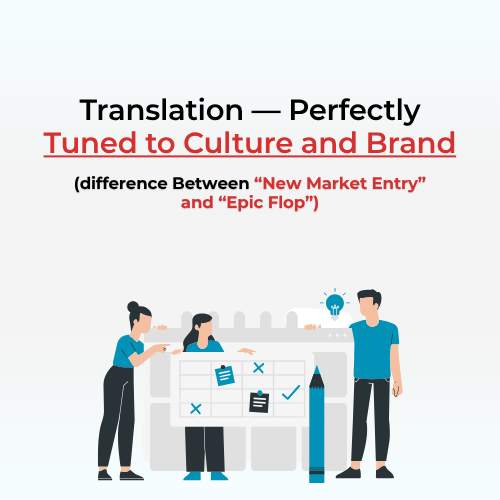
Certified Korean Translation Services: For When Accuracy Is Kind of a Big Deal
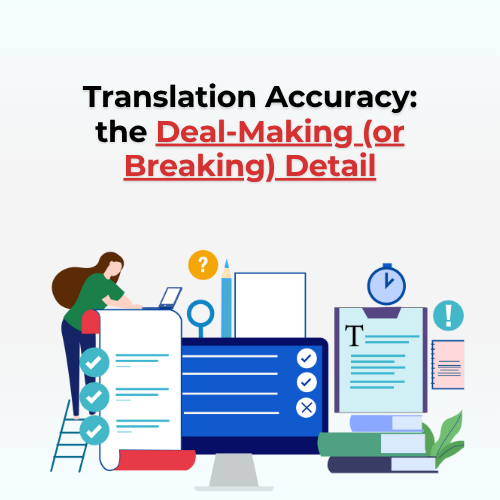
Let’s talk paperwork. The kind that needs to make sense legally, not just “I think I know what that means”-ish.
Certified Korean translation services aren’t some marketing gimmick. They’re what you need when a government agency, immigration office, or law firm says, “We require an official translation,” and you say, “Cool, let me ask my cousin who lived in Busan for a semester, do it ”
Spoiler: They’ll say no. Possibly twice. In writing.
Hence, whether you’re applying for a visa, filing patents, or sending business proposals, certified translations guarantee that your documents won’t end up as punchlines in someone’s group chat.
What to Look for in a Korean Translation Company (Besides Not Being a Disaster)
So, what separates a professional translation company from a guy with Google Translate Premium and an unhealthy obsession with Korean dramas?
Start here:
- Native Korean translators (yes, human ones)
- Industry-specific experience (tech, legal, medical—whatever flavor of chaos your business runs on)
- Certifications and quality checks
- Confidentiality (because no one needs your product roadmap leaked to a K-Drama fan club)
Pro tip: Ask for samples, references, and actual humans you can talk to. If their website feels like it was translated by a robot, for a robot, run.
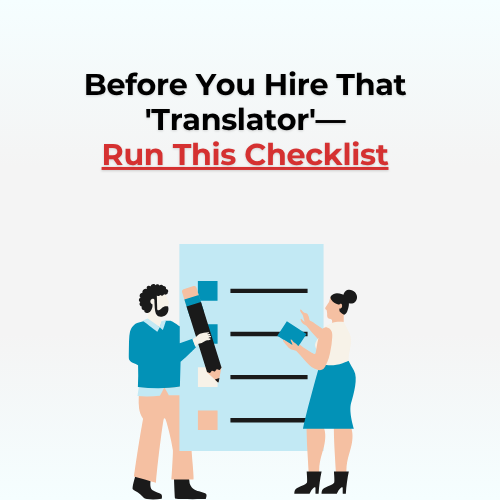
Why English Korean Translation Is Basically the New Business Card (But Smarter and Less Likely to Be Tossed in the Trash)
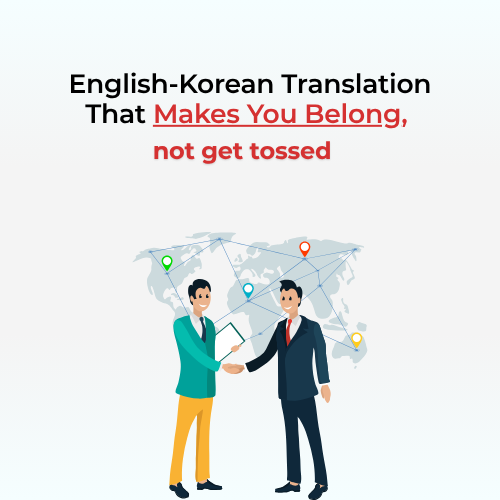
You know what’s cooler than speaking your customer’s language? Speaking it like you belong at their boardroom table. That’s what English Korean translation does when it’s done right, not just linguistically accurate, but contextually slick.
You will say that any app can do that. But don’t you think it will also make you sound like a confused time traveler?
This is about being trusted, respected, and dare we say, liked by Korean partners, investors, and clients.
Let’s put it this way: global expansion post-2020 isn’t just about hopping on Zoom calls and quoting numbers. It’s about navigating silent hierarchies, knowing when to bow (figuratively, of course), and crafting messaging that doesn’t obviously show , “We Googled this 5 minutes ago.”
If your English-to-Korean communication feels like it was written by your intern who once watched a K-drama … we have some notes.
Smart businesses don’t just “translate.” They invest in culturally fluent, business-savvy storytelling that lands the deal without needing subtitles.
FAQ Time: Because People Ask the Weirdest Things
How to choose a Korean translation provider?
Choose a provider with proven experience in Korean business translation, industry-specific knowledge, native Korean linguists, and a clear confidentiality policy. Look for certifications like ISO or ATA, verified client reviews, and the ability to handle formal documents, contracts, and technical content—not just casual or literary translation. Prioritize providers who understand both Korean and your business context.
How are you – Korean translation?
“Annyeonghaseyo.” Polite, safe, and doesn’t accidentally insult anyone’s ancestors. You’re welcome. It’s the equivalent of saying “Hi” without starting a global incident.
How accurate is Google Translate for Korean?
Well, Google Translate is like that one friend who swears they’re great at karaoke but can barely hold a note. It’ll get you by… if you’re not looking to sign a multi-million-dollar contract in Korean. For anything serious, leave it to the pros.
How long does it take to translate a Korean document?
Well, that depends. Is it a short email or a 200-page contract about the future of international trade? If it’s the latter, get comfy. Your translator’s probably in a cave somewhere with caffeine and snacks. But generally, expect a few days for something of decent length.
Can a Korean translator help me understand Korean business etiquette?
Yes, and thank goodness, because you don’t want to show up at a meeting, bow at the wrong time, or hand over your business card with the wrong hand (hello, awkward). A translator will make sure you’re not just speaking the language, but speaking the culture.
Signing Off:
So… What Did We Learn (Besides “Always Check Subtitles”)?
Let’s bring it full circle. That K-drama? Still no clue what happened in Episode 1. For all I know, it was about kimchi-fueled revenge and a time-traveling shoe. But here’s what I learned: context is everything.
Without the right translation, even the most heartfelt story- or business pitch-gets lost faster than me trying to explain Squid Game to my grandma.
In business, a mistranslation isn’t just awkward. It’s expensive.
You don’t want to be the company that promised “a spicy partnership” when you meant “a strategic partnership.” Or the brand whose product manual sounds like a fortune cookie with identity issues.
So if your clients are in Seoul, Busan, or anywhere on Earth where Korean is the language of trust, don’t wing it. Don’t app it.
Translate like you mean it.
Because great Korean translation doesn’t just save you from subtitle confusion. It makes sure your business sounds smart, strategic, and ready for the big leagues.
Now, if you’ll excuse me, I’ll just put back on the K-drama for my cousin to rewatch, with subtitles this time.
And you, please connect now for those accurate Korean translation services for your business.
